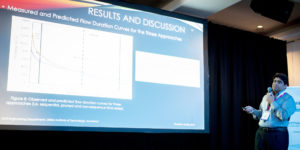A Unitec research project using Artificial Intelligence to help predict rainfall run-off drew interest at a recent stormwater conference.
Floods are becoming a more pressing problem in New Zealand; in fact, they are the country’s number-one hazard in terms of frequency, losses and declared civil-defence emergencies, according to Civil Defence.
At the recent 2018 Stormwater Conference, attended by more than 300 local and international participants, senior engineering lecturer Dr Babar Mahmood presented findings of a research project that used Artificial Intelligence (AI) to predict how catchment areas are affected by greater volumes of water – which can be used to create plans to manage future floods.
Mahmood supervised final-year Bachelor of Engineering Technology student Zhimin Zheng in the research, which drew interest at the conference from nationwide consulting firms. Most participants weren’t aware that the AI technique known as Artificial Neural Network (ANN), which the pair used, could be applied to predicting flood run-off.

Babar Mahmood presenting at the 2018 Stormwater Conference.
“The building block of an ANN acts in a similar way to how a synapse in our brain enables the connection of neurons, except it’s a computer program with code. ANN is being used more frequently as an alternative modelling tool in water-resource engineering and management studies – it’s more flexible and requires less data than traditional models,” says Mahmood.
“We taught ourselves to use the neural network tool in MATLAB software, trained and tested the model, and used data from the Waikato region to train the model to predict the amount of run-off during a period of rain.”
Urban areas and gauged catchments have instruments to measure rainfall, wind velocity and flow rates, but Mahmood says, “Even in more accessible areas, you still need to take into account factors such as rainfall duration and intensity, whether rain falls on hard or permeable surfaces, water collection systems, soil type, and other catchment characteristics. It’s more difficult again to predict the level of run-off in more remote areas.”
More testing is needed, but Mahmood is convinced the ANN model has the potential to help predict rainfall run-off – and potentially help those in remote areas, such as the North Island’s East Coast, better prepare for future floods.





